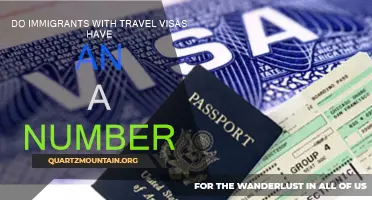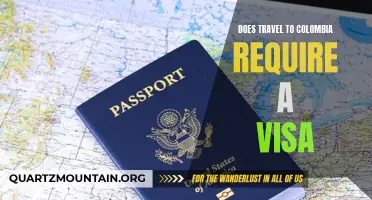
Switzerland, a breathtakingly beautiful country nestled in the heart of Europe, is renowned for its stunning landscapes, charming cities, and rich cultural heritage. Whether you are planning a ski trip to the Alps or exploring the historic streets of Zurich, visiting Switzerland is a dream come true for many travelers. However, before embarking on your adventure, it is essential to be aware of the visa requirements for traveling to Switzerland. In this guide, we will delve into the various visa options and provide you with all the information you need to ensure a smooth and hassle-free journey to this enchanting destination. So, sit back, relax, and let us unravel the mysteries of Swiss travel visas.
What You'll Learn

Visa requirements for travelers to Switzerland

Switzerland, with its breathtaking landscapes and vibrant cities, is a popular destination for travelers from around the world. If you're planning a trip to this enchanting country, it's important to understand the visa requirements in order to ensure a smooth and hassle-free journey. In this article, we will provide you with all the information you need to know about visas for travelers to Switzerland.
Who needs a visa to travel to Switzerland?
The visa requirements for travelers to Switzerland vary depending on your nationality. While some nationalities are exempt from obtaining a visa, others must apply for one before their trip. Here is a rundown of who needs a visa to travel to Switzerland:
- Non-European Union (EU) and non-European Free Trade Association (EFTA) nationals: If you are a citizen of a non-EU and non-EFTA country, you generally need a visa to enter Switzerland. Some examples of countries whose citizens require a visa include China, India, Russia, and South Africa. However, there are exceptions, and citizens of certain countries may be eligible for visa exemption or simplified visa procedures.
- European Union (EU) and European Free Trade Association (EFTA) nationals: Citizens of EU and EFTA member states, such as Germany, France, Italy, and Norway, do not need a visa to travel to Switzerland. They can enter and stay in the country for up to 90 days within a 180-day period without a visa.
Visa exemption for certain nationalities:
Switzerland offers visa exemptions for citizens of several countries. These exemptions allow travelers to enter and stay in the country for a limited period without a visa. Below are some examples of nationalities that are exempt from obtaining a visa for Switzerland:
- United States (US) citizens: US citizens do not need a visa to travel to Switzerland for tourism or business purposes. They can stay in the country for up to 90 days within a 180-day period without a visa.
- Australia, Canada, and New Zealand citizens: Citizens of Australia, Canada, and New Zealand do not require a visa for Switzerland. They can stay in the country for up to 90 days within a 180-day period for tourism or business purposes.
- Japan and South Korea citizens: Japanese and South Korean citizens can also enter Switzerland without a visa for tourism or business purposes. They can stay in the country for up to 90 days within a 180-day period visa-free.
Duration of stay allowed without a visa:
If you don't need a visa to travel to Switzerland, you can stay in the country for a limited period without any additional paperwork. The duration of stay allowed without a visa for eligible nationalities is 90 days within a 180-day period. This means that you can spend a total of 90 days in Switzerland within a period of 6 months.
It's important to note that these 90 days are cumulative and apply to all Schengen Area countries, of which Switzerland is a member. This means that if you have already spent some time in other Schengen countries, those days will be deducted from the total number of days you can spend in Switzerland without a visa.
In conclusion, understanding the visa requirements for travelers to Switzerland is crucial for a successful trip. Non-EU and non-EFTA nationals generally need a visa, while EU and EFTA nationals are exempt. Additionally, citizens of certain countries, such as the United States, Australia, and Japan, can enter Switzerland without a visa for up to 90 days within a 180-day period. Make sure to check the specific requirements for your nationality and plan your trip accordingly to ensure a hassle-free journey to this magnificent country.
Traveling through Amsterdam with an Expired US Visa: What You Need to Know
You may want to see also

Applying for a visa to Switzerland

Switzerland, known for its stunning landscapes, vibrant cities, and rich culture, has become a sought-after destination for travelers worldwide. Before embarking on your Swiss adventure, it's essential to understand the visa requirements and application process. In this article, we will explore the different types of visas available for travelers, the required documents, and the visa application process and fees.
Types of Visas Available for Travelers:
Switzerland offers various types of visas, depending on the purpose and duration of your stay. Here are the most common ones:
- Schengen Visa: This visa allows travelers to visit Switzerland and other Schengen Area countries for tourism, business, or medical purposes. It is valid for a stay of up to 90 days within a 180-day period.
- National Visa: A national visa, also known as a D visa, is required for longer stays, such as study, work, or family reunification. It allows travelers to stay in Switzerland for more than 90 days.
Required Documents for Visa Application:
To apply for a visa to Switzerland, you need to gather and submit the following documents:
- Completed Visa Application Form: Fill out the online visa application form accurately, providing all the required information.
- Passport: Your passport must be valid for at least three months beyond your intended stay. It should also have at least two blank pages to affix the visa.
- Passport-Sized Photographs: Attach two recent color passport-sized photographs that meet the Schengen visa photo requirements.
- Travel Itinerary: Submit a detailed travel itinerary, including flight reservations, accommodation bookings, and planned activities.
- Travel Health Insurance: Obtain travel health insurance that covers medical expenses and emergencies during your stay in Switzerland. The insurance should have a minimum coverage limit of €30,000.
- Proof of Accommodation: Provide proof of accommodation, such as hotel bookings or a letter of invitation from a Swiss resident if you are staying with friends or family.
- Proof of Financial Means: Show proof of sufficient funds to cover your stay in Switzerland, such as bank statements, credit card statements, or sponsorship letters.
- Employment Documents: If you are traveling for business purposes, include employment documents like an employment contract, proof of business registration, or an invitation from a Swiss company.
Visa Application Process and Fees:
The visa application process for Switzerland involves these steps:
- Gather all the required documents mentioned earlier.
- Schedule an appointment: Visit the website of the Swiss embassy or consulate in your country to schedule an appointment.
- Submit your application: Attend the appointment in person and submit your application along with the required documents. Pay the visa application fee, which is non-refundable even if your visa gets rejected.
- Biometric data collection: During your appointment, you will be required to provide your biometric data, including fingerprints and a digital photograph.
- Visa processing: The processing time for a Swiss visa can vary, but it usually takes around 10 to 15 working days. In some cases, it may take longer, so it's advisable to apply well in advance of your travel dates.
- Visa collection: Once your visa is approved, you can collect it from the embassy or consulate. Some countries also offer a courier service to deliver the visa to your doorstep for an additional fee.
The visa application fees for Switzerland vary depending on the type and duration of your visa. It is advisable to check the current fees on the official website of the Swiss embassy or consulate in your country. Remember that the visa application fee is non-refundable, even if your visa application is rejected.
In conclusion, applying for a visa to Switzerland requires careful planning and thorough understanding of the visa requirements. Make sure to gather all the necessary documentation, submit a complete application, and follow the application process outlined by the Swiss authorities. With the right preparation, you'll soon be able to embark on a memorable journey to the breathtaking landscapes of Switzerland.
Traveling to Canada with a US Visa: Everything You Need to Know
You may want to see also

Schengen visa and traveling within Switzerland

If you are planning a trip to Switzerland, it is important to understand the concept of a Schengen visa and how it applies to your travel plans. Switzerland is a part of the Schengen Area, which is a group of 26 European countries that have abolished passport control at their mutual borders. This means that once you enter Switzerland with a valid Schengen visa, you are free to travel to any other Schengen country without the need for additional visas or border checks.
One of the main benefits of having a Schengen visa for traveling in Europe is the convenience it offers. With a single visa, you can explore multiple countries without the hassle of applying for separate visas for each destination. This not only saves you time and effort but also allows you to have a more flexible travel itinerary.
Another advantage of having a Schengen visa is the freedom of movement it provides. Once you have entered the Schengen Area, you can travel freely between member countries without any border controls. This means that you can easily explore neighboring countries such as France, Germany, Italy, and Austria, among others, while enjoying the beautiful Swiss landscapes.
However, it is important to note that there are certain rules and limitations associated with a Schengen visa. Firstly, the visa is valid for a maximum of 90 days within a 180-day period. This means that you cannot stay in the Schengen Area for more than 90 days within a span of 6 months. It is essential to plan your trip accordingly and make sure that you do not exceed this limit to avoid any legal issues.
Additionally, it is important to have a clear understanding of the purpose of your visit when applying for a Schengen visa. Whether you are traveling for tourism, business, or any other specific reason, you must provide the necessary documentation to support your application. This may include flight and hotel bookings, travel itinerary, financial proof, and a valid travel insurance policy.
It is also worth mentioning that while Switzerland is a part of the Schengen Area, it is not a member of the European Union. Therefore, the rules and regulations for visiting Switzerland may differ slightly from other Schengen countries. However, with a valid Schengen visa, you can still enjoy the benefits of traveling freely within Switzerland and other Schengen countries.
In conclusion, a Schengen visa is a valuable asset for anyone planning to travel within Switzerland and other European countries. It offers convenience, flexibility, and freedom of movement, allowing you to have a seamless travel experience. Just make sure to adhere to the rules and limitations associated with the visa to ensure a smooth journey.
How Can Travel Agencies Assist with Visa Applications?
You may want to see also

Additional information for travelers to Switzerland

When planning a trip to Switzerland, it's important to be aware of the additional information that may be required for travelers. This includes understanding the travel insurance requirements, border control and entry requirements, as well as the process for extending your stay or changing your visa status. In this blog post, we will guide you through these essential details to help ensure a smooth and stress-free trip.
Travel Insurance Requirements in Switzerland
Having travel insurance is highly recommended for anyone visiting Switzerland. While it is not a legal requirement, it can provide you with valuable protection in case of any unexpected events or emergencies. Your travel insurance should include coverage for medical expenses, emergency evacuation, trip cancellation, and lost or stolen belongings. Before purchasing travel insurance, carefully review the policy to ensure it meets your specific needs and provides adequate coverage for activities you plan to engage in during your trip to Switzerland.
Border Control and Entry Requirements
Switzerland is a member of the Schengen Area, which consists of 26 European countries that have abolished passport control at their mutual borders. This means that if you are a citizen of a country within the Schengen Area, you can travel to Switzerland without needing to go through border control. However, it is still essential to carry a valid passport or government-issued identification card with you at all times. Non-Schengen Area citizens will need to go through passport control upon arrival in Switzerland and should ensure they have the necessary visa or entry permit.
Extension of Stay or Changing Visa Status
If you wish to extend your stay in Switzerland or change your visa status, it's important to be aware of the necessary procedures and requirements. The exact process may vary depending on the type of visa you currently hold and the reason for your desired extension or change. Generally, you will need to submit a formal application to the relevant Swiss authorities, such as the Federal Office for Migration. It's recommended to start the process well in advance, as it may take some time for your request to be processed. It's important to note that overstaying your visa without obtaining the necessary permission or extension is a violation of Swiss immigration laws and may result in penalties or difficulties in future visits to Switzerland.
To apply for an extension or change in visa status, gather all the required documents, such as a valid passport, proof of financial means, and any supporting documentation relevant to your request. Contact the Federal Office for Migration or a Swiss embassy or consulate in your home country to obtain detailed information on the specific requirements and procedures for your particular situation. It's also highly recommended to consult with an immigration lawyer or expert who can guide you through the process and ensure compliance with Swiss immigration laws.
In conclusion, when planning a trip to Switzerland, being aware of the additional information for travelers is crucial. Make sure to have appropriate travel insurance coverage to protect yourself in case of emergencies. Familiarize yourself with border control and entry requirements depending on your citizenship or visa status. If you need to extend your stay or change your visa status, be prepared to follow the necessary procedures and requirements set by the Swiss authorities. By paying attention to these details in advance, you can help ensure a smooth and hassle-free experience during your time in Switzerland.
Navigating International Travel on an Active B1 Visa After Filing the I-130 Application
You may want to see also
Frequently asked questions
Yes, it depends on your nationality. Citizens of the European Union (EU) and the European Free Trade Association (EFTA) countries do not need a visa to enter Switzerland. However, citizens of other countries like the United States, Canada, Australia, and many others, typically do not need a visa for short stays of up to 90 days.
As a tourist, you can stay in Switzerland for up to 90 days without a visa. This applies to citizens of countries that do not require a visa for short stays. If you wish to stay longer than 90 days, you will need to apply for the appropriate visa or residence permit before your trip or once you are in Switzerland.
No, you cannot work or study in Switzerland without the appropriate visa or permit. If you plan to work or study in Switzerland, you will need to apply for a work visa or a student visa before your trip. It is important to check the specific requirements and procedures for your situation as they may vary depending on your nationality and the type of work or study you plan to undertake.
To apply for a visa to travel to Switzerland, you will need to contact the Swiss consulate or embassy in your country. They will provide you with the necessary application forms and guidance on the required documents. The application process may involve submitting your passport, proof of travel arrangements, proof of accommodation, proof of financial means, and other supporting documents. It is recommended to apply well in advance of your intended travel dates to allow sufficient time for processing.
Yes, if you already have a valid Schengen visa issued by another Schengen country, such as France, Germany, or Italy, you can use it to enter Switzerland. Switzerland is part of the Schengen Area, which allows for the free movement of travelers between its member countries. However, it is worth noting that if Switzerland is your main destination, you should apply for a visa specifically for Switzerland to avoid any potential issues or confusion at the border.







